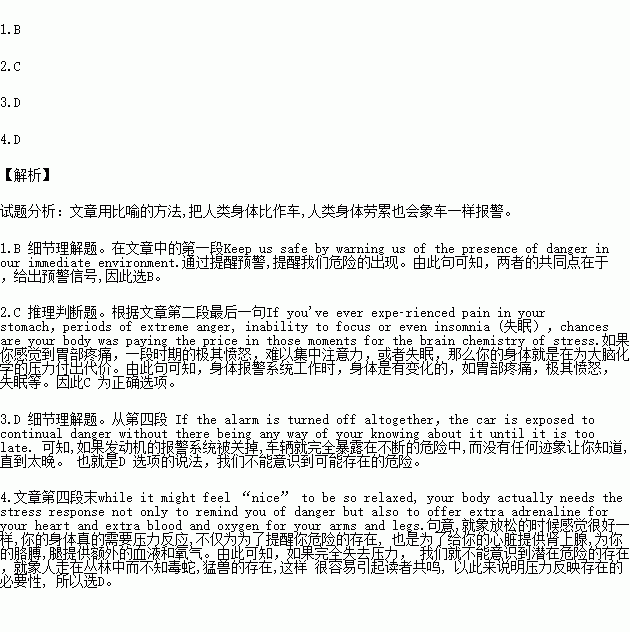题目内容
While I will explain a bit about the science of stress and relaxation a little later simple way to think about it is that our body 's stress response works like a car alarm. Keep us safe by warning us of the presence of danger in our immediate environment.
But instead of warning us with a loud and annoying sound,our body alarm system lets us know that something is wrong by creating changes in our neurochemistry (神经化学).If you've ever experienced pain in your stomach,periods of extreme anger, inability to focus or even insomnia (失眠),chances are your body was paying the price in those moments for the brain chemistry of stress.
So if it's so uncomfortable,why not just get rid of stress altogether?
This is not only impractical,it would be dangerous. Let's go back to the metaphor (比喻说法)of the car alarm. If the alarm is turned off altogether,the car is exposed to continual danger without there being any way of your knowing about it until it is too late. It would be like walking through the jungle without any fear signal in the presence of a poisonous snake or other dangerous animals — while it might feel “nice” to be so relaxed,your body actually needs the stress response not only to remind you of danger but also to offer extra adrenaline (肾上腺素) for your heart and extra blood and oxygen for your arms and legs.
However,if the car alarm goes off at any time,someone just looks at the car with a bit of an attitude,and it becomes equally useless. Not only do we stop paying attention to it,but it begins to drive us and everyone around us becomes a little bit crazy. In the case of our bodies,walking around in a constant state of alarm also has some pretty alarming health consequences,which we will explore in greater depth in the next chapter.
1.Our body's stress response is compared to a car alarm in that .
A. they work all the time B. they both give a signal
C. they work in the same way D. they both produce a sound
2.When our body alarm system works, .
A. we feel calm
B. we feel excited
B. some changes happen in our brain
D. some changes happen in our heart
3.What would happen if stress were got rid of completely?
A. We'11 be free of worries.
B. We'11 achieve a sense of safety.
C. We'11 reach a perfect state of mind.
D. We'11 fail to realize the possible danger.
4. What's the purpose of giving the example of walking through the Jungle in Paragraph 4?
A. To show the harm of stress.
B. To show the effect of stress.
C. To explain the function of stress response.
D. To explain the necessity of stress response.
 开心练习课课练与单元检测系列答案
开心练习课课练与单元检测系列答案 开心试卷期末冲刺100分系列答案
开心试卷期末冲刺100分系列答案
